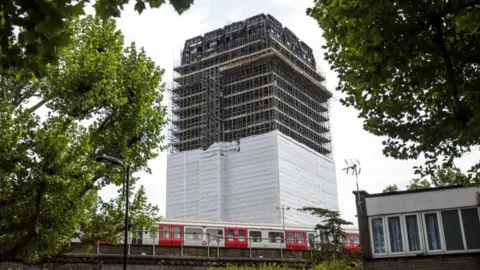Cladding ban plan in Wales after Grenfell Tower fire
 Getty Images
Getty ImagesPlans to ban inflammable cladding on high-rise buildings in Wales will go out to public consultation, the housing minister has said.
Rebecca Evans announced the move despite an independent review into the London Grenfell Tower tragedy not recommending it
Inflammable cladding is thought to have contributed to the rapid spread of fire in June 2017 which claimed 72 lives.
Some Welsh high-rise buildings failed tests carried out after the fire.
They include Newport where cladding is to be replaced while tests in Swansea initially failed before cladding was later deemed to be safe.
Last week, a UK government-commissioned building regulations review led by Dame Judith Hackitt stopped short of proposing a ban - a move criticised by some Grenfell survivors.
The Royal Institute of British Architects wants a ban on inflammable cladding, as well as a requirement for sprinklers to be fitted, and a second means of escape for high-rise residential buildings.
In Wales, sprinklers are compulsory in new-builds but some councils including Cardiff and Swansea have opted to install in high rise buildings too.
Ms Evans said the Welsh Government would make the "radical and far-reaching reforms to the regulatory system" which Dame Judith has called for.
 Google
Google"She was right to point out that underlying failures of culture and of the regulatory system may allow unsafe practices and products to persist and those failures will manifest themselves in other ways unless they are addressed head-on," she said.
"But I cannot ignore the risks and the clear public concern.
"Subject to a legally-required consultation into this matter, we will move to ban the use of combustible materials in cladding systems on high-rise residential buildings in Wales.
"Dame Judith's report was addressed to the UK Government, and reflected the current position in England. While the statutory framework here is similar, our institutions, our housing stock and our risks are different.
"We must consider Dame Judith's recommendations in our own context and apply the principles to our proposals for a new, robust system in Wales."
